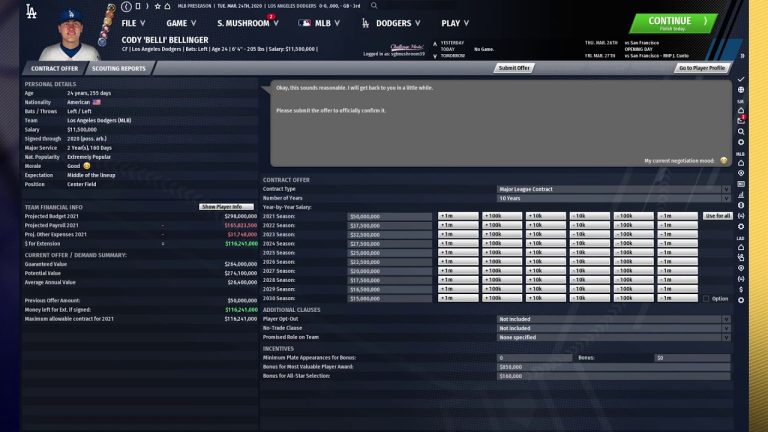
Opt-out clauses have become the latest trend in baseball contracts, allowing players to have greater control over their future. These contractual provisions provide an opportunity for players to assess their performance and market value, giving them the flexibility to potentially explore new opportunities or negotiate more favorable terms. With opt-out clauses becoming increasingly common, their presence in contracts has revolutionized the dynamics of player-team relationships, leaving fans and analysts eager to see how these clauses will shape the future of the game.
What does the MLB opt out clause entail?
An MLB opt-out clause refers to a contractual provision that grants a player the freedom to terminate their existing contract and venture into the free agent market. This powerful tool empowers players to reassess their value, explore better opportunities, and potentially secure more lucrative deals. By exercising their opt-out clause, players can strategically position themselves to capitalize on their performance and negotiate more favorable terms, making it a game-changing feature in the world of Major League Baseball.
In the dynamic realm of professional baseball, the MLB opt-out clause stands as a pivotal game-changer. This contractual provision allows players to break free from their current agreements, unlocking a realm of possibilities as they enter the free agent market. By leveraging the opt-out clause, players seize control of their destiny, embracing the opportunity to reevaluate their worth and secure more advantageous contracts. With the power to reshape careers and reshape the landscape of the sport, the MLB opt-out clause has become a highly sought-after feature, offering players the chance to redefine their futures and leave a lasting impact on the game.
What does the term opt out clause mean?
An opt-out clause is a powerful tool in contracts, granting signatories the freedom to disengage from specific provisions or even terminate the entire agreement ahead of schedule. This provision allows parties to maintain control over their involvement in the contract and provides the flexibility needed to adapt to changing circumstances. By incorporating an opt-out clause, parties can mitigate risks, safeguard their interests, and ensure a more balanced and mutually beneficial contractual relationship.
What is the meaning of opt in baseball?
In baseball, “opt” refers to a player option, which is a term used to describe an optional year at the end of a contract. This means that the player has the choice to either exercise their option and secure a guaranteed salary for that year, or they can reject the option and explore the possibility of becoming a free agent. It gives the player the power to make a decision based on their own preferences and circumstances, adding flexibility to their career trajectory.
A player option in baseball grants the player the ability to control their own destiny. Whether they choose to exercise the option and secure a guaranteed salary or decline it to test the waters of free agency, it provides them with a valuable opportunity to shape their career. This concept empowers players by giving them the freedom to make choices that align with their goals and aspirations, ultimately influencing the trajectory of their professional journey.
Unlocking Flexibility: The Power of Opt-Out Clauses in Baseball Contracts
Unlocking Flexibility: The Power of Opt-Out Clauses in Baseball Contracts
In the ever-evolving world of professional baseball contracts, opt-out clauses have emerged as a powerful tool for both players and teams. These clauses allow players to potentially leave their contracts before their expiration date, granting them the freedom to explore better opportunities or negotiate new terms. For teams, opt-out clauses provide a level of flexibility in managing their roster and resources. They can use these clauses as leverage to incentivize players to perform at their best, knowing that if they underperform, the player may choose to opt-out. This dynamic has revolutionized the way contracts are structured in baseball, creating a win-win situation for both players and teams, and unlocking a new level of flexibility in the game.
Shaping the Game: How Opt-Out Clauses Revolutionize Baseball Contracts
In the ever-evolving world of baseball contracts, opt-out clauses have emerged as a revolutionary tool, reshaping the game and giving players unprecedented control over their futures. These clauses, strategically inserted into contracts, allow players to exit their current deals and become free agents before their initial term expires. With the power to renegotiate contracts or seek better opportunities, opt-out clauses have transformed the dynamics of player-team relationships. No longer bound by long-term commitments, players are now able to leverage their performance and market value, ultimately reshaping the landscape of baseball contracts and challenging the traditional notion of loyalty in sports.
Changing the Game: The Impact of Opt-Out Clauses on Baseball Contracts
Changing the Game: The Impact of Opt-Out Clauses on Baseball Contracts
Opt-out clauses have revolutionized the landscape of baseball contracts, providing players with unprecedented flexibility while simultaneously reshaping the dynamics of team management. These contractual provisions, allowing players to terminate their contracts before their expiration dates, have become a powerful bargaining tool for athletes seeking to capitalize on their performance peaks or secure more lucrative deals. By giving players the ability to re-evaluate their options and potentially earn higher salaries, opt-out clauses have elevated the importance of short-term performance, forcing teams to carefully assess the risk and reward of long-term commitments. As a result, baseball contracts have evolved into a delicate balance between financial security and the potential for greater rewards, forever changing the way the game is played and negotiated.
In the ever-evolving landscape of baseball contracts, opt-out clauses have emerged as powerful tools for both players and teams. By allowing players to reassess their options and potentially seek new opportunities, these clauses bring an element of flexibility and adaptability to the game. While some argue that they disrupt team continuity and stability, it is undeniable that opt-out clauses have become an integral part of modern baseball contracts. As the sport continues to evolve, it will be fascinating to see how these clauses shape the future of the game and the careers of its players.
